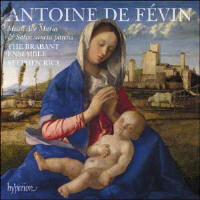Texte paru dans: / Appeared in: |
|
|
Outil de traduction ~ (Très approximatif) |
|
|
Reviewer: James
V. Maiello For two decades, Stephen Rice and the Brabant Ensemble have dedicated themselves to performing and recording sacred music of the Renaissance. Their work has led to a greater appreciation of composers such as Gombert, Manchicourt, and Clemens non Papa, due in large part to some 18 recordings on the Hyperion label. Turning here to Antoine de Févin, they offer nuanced readings of the composer’s Missa Ave Maria and his Missa salve sancta parens, as well as two motets. In addition to his other talents, Rice is a well-respected musicologist, and his liner essay is worth a special mention. It is erudite and engaging (occasionally even wry), a flawlessly crafted piece that contextualizes Févin’s music in its musical and cultural milieu and leads the listener through the music.
The Missa Ave Maria is a
parody Mass based on Josquin des Prez’s famous motet. Févin’s sophisticated
deployment and transformation of material from the motet unfolds in a
half-hour of inventive polyphony. Rice’s tempos are slow enough to savor
Févin’s counterpoint, but he avoids any hint of plodding. Similarly, the
ensemble does not slow down too much as it approaches cadences, letting the
music itself carry the line (e.g., at the end of the Gloria). The result is
unhurried, but not indulgent. Among the highlights of the performance, the
ensemble treats Févin’s Agnus Dei astutely, emphasizing the comforting
meaning of the text with gently undulating phrases and an overarching
feeling of serenity. Throughout, the choral sound is rich and well balanced;
when individual voices come to the foreground, it is tasteful and invariably
complements the polyphony.
Févin uses the older
paraphrase technique for the Missa Salve sancta parens, taking a Marian
introit as a model. Rice has included the plainchant antiphon here, which
familiarizes listeners with the musical material before it is manipulated in
the polyphony. Responding to the more sectional nature and the particular
stylistic conventions of the paraphrase Mass, the ensemble treats this Mass
somewhat more rigidly than the Missa Ave Maria. This is a brilliant
interpretive decision that pays off handsomely, clarifying musical structure
and providing a welcome contrast to the other Mass on the program. As one
has come to expect from the Brabant Ensemble, the diction is exquisitely
precise and the polyphonic texture transparent. Among the motets, Ascendens Christus in altum is a forward-looking expression of the joyous message of the Ascension, punctuated by an exuberant Alleluia. The singers offer a robust performance, sailing through ascending lines that underscore the meaning of the text. Two versions of Sancta Trinitas follow, the original four-voice motet and a six-voice version with two extra lines added by a younger composer, Arnold von Bruck. This disc would be noteworthy simply for bringing Févin’s music to a wider audience (indeed, it is the only recording of these Masses of which I am aware). These are also fine performances, though. They are pristine, technically, but the singers infuse the music with a vitality that is sometimes lacking in Renaissance sacred polyphony. Moreover, the interpretive decisions—and this presumably falls largely on the shoulders of Stephen Rice—are carefully considered and highly intelligent. I have always found the Brabant Ensemble’s recordings inspiring, musically, and this disc certainly reinforces that impression. It is sure to become a favorite. | |
|
|
|
|
Cliquez l'un ou l'autre
bouton pour découvrir bien d'autres critiques de CD |
|




